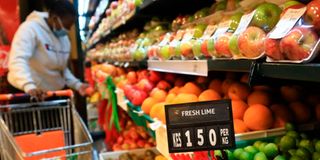Kenya's inflation hits 19-month high

A customer picks fruit at a supermarket in Nyeri on August 7, 2021.
Kenya's inflation rate has hit a 19-month high in September as the recent fuel price hike starts hurting households.
Latest data from the Kenya National Bureau of Statistics (KNBS) shows that this month's inflation rate grew to 6.91 per cent in September, the highest since February last year when it stood at 7.17 per cent.
KNBS Director-General Macdonald Obudho said on Thursday that the rise was driven by an increase in prices of food and non-alcoholic beverages, housing, water, electricity, gas and other fuels.
Mr Obudho said prices of commodities under food and non-alcoholic beverages rose by 10.63 per cent, transport by 9.21 per cent and housing, water, electricity, gas and other fuels by 6.08 per cent between September 2020 and September 2021.
“The CPI increased by 0.32 per cent from an index of 115.710 in August 2021 to 116.077 in September 2021. The month-to-month Food and Non-Alcoholic Drinks’ Index increased by 0.11 per cent between August 2021 and September 2021. This was mainly attributed to increase in prices of some food items, which outweighed the decrease in prices of others,” KNBS said.
This comes at a time when the Central Bank of Kenya (CBK) has raised alarm over the direction the inflation rate has taken, warning that though it has the tools to deal with second wave of inflation, it cannot deal with imported inflation.
“The principal drivers where the inflation is coming from are things that don’t react to monetary policy. That is really the point. It’s not that we are sitting doing nothing,” CBK Governor Dr Patrick Njoroge said.
The regulator's inflation target is between 2.5 per cent and 7.5 per cent.
“No matter how much we change or tighten monetary policy, it won’t affect the imported price of Murban oil. The prices will be passed on to consumers in the usual way. That is the first-round effect,” Dr Njoroge said.
He said the second-round effect is when fuel prices lead to an increase in other costs such as transportation, electricity and others.
“If we allow inflation to just surge into the worst case, we would be missing on our mandate. That is not a scenario that we are willing to do nothing about. There will always be an active scenario, which is when we come in and take policy action to stop inflation from surging,” he added.
KNBS says that relative to August 2021, prices of carrots, oranges and cabbage increased by 3.25, 2.43 and 2.10 per cent, respectively. In contrast, prices of tomatoes, maize flour (sifted) and spinach decreased by 2.30, 0.99 and 0.83 per cent, respectively.
The housing, water, electricity, gas and other fuels’ index increased by 0.91 per cent between August 2021 and September 2021. This was mainly attributed to increase in prices of kerosene, electricity and gas/LPG.
There was a slight decrease in house rent during the same period.
The transport Index increased by 1.17 per cent mainly due to increases in prices of petrol and diesel that went up by 5.91 per cent and 7.3 per cent respectively.
Bus fares of city public service vehicles also recorded an increase of 0.64 per cent.





